|
Have you ever wondered why conflict seems inevitable with certain people in your life, especially family members? No matter how much you grow, they still treat you the way they always have—like the child, the troublemaker, or the person they once knew. This disconnect often leads to frustration, misunderstandings, and even emotional pain. The Root of Conflict: A Perception Gap Conflict often arises when who others think we are no longer matches who we have become. They interact with an outdated version of us, while we expect them to see and respect the person we are today. For example, a parent may still treat their adult child like they are incapable, simply because that’s how they remember them. Meanwhile, the child—now grown and independent—resents being treated that way. The result? Repeated arguments, emotional triggers, and a cycle of frustration. This dynamic isn’t just limited to parent-child relationships; it happens in friendships, romantic relationships, and even workplaces. The version of you that people hold in their minds is often based on past interactions, and unless something forces them to update their perception, they continue responding to you in the same old ways. Why People Struggle to See Our Growth People are naturally resistant to change—especially when it comes to relationships. Familiarity feels safe, even if the dynamic is unhealthy. When someone sees you differently, it forces them to question their role in the relationship. For example, a controlling parent might feel less needed if they acknowledge that their child has become independent. A long-time friend may feel threatened if they see you growing in ways they haven’t. A romantic partner may resist change because they fear losing the dynamic they once knew. Without realizing it, people may try to pull you back into old patterns not out of malice, but out of their own fears and insecurities. How We Keep Ourselves Stuck in Old Dynamics Even when we’ve grown, our reactions often reinforce the past version of us. If you’ve always argued with a parent who belittles you, reacting defensively only confirms their belief that you are still the same. If a friend still treats you like the reckless person you used to be, and you get frustrated instead of calmly correcting them, you feed their outdated perception. This is why it’s refreshing to meet new people. They see us as we are today—without the baggage of past interactions. But this doesn’t mean old relationships are doomed. They can be rekindled if both parties become aware of these dynamics. How to Shift the Relationship Dynamic 1. Understand Their Perception • Instead of assuming they are intentionally disrespecting you, recognize that they simply don’t see your growth yet. • Ask yourself: “What version of me do they see?” and “Why might they struggle to update that perception?” 2. Communicate Your Growth • You can’t expect people to just know you’ve changed. Show them through actions and words. • Example: Instead of saying, “I’m not a child anymore,” demonstrate it by handling situations with maturity and confidence. 3. Stop Reacting Like Your Old Self • When you react emotionally in a way that matches their outdated view of you, you reinforce it. • Instead, respond as your present self—with calmness, confidence, and clarity. 4. Give It Time • People don’t change their perceptions overnight. Consistently embody the new version of yourself, and eventually, they will have no choice but to recognize it. Final Thoughts Conflict in relationships isn’t always about who is right or wrong—it’s often about perception gaps. Your growth is real, but the people in your life may not see it yet. Instead of expecting them to automatically adjust, take responsibility for helping them see the new you. The more aware we are of these dynamics, the more power we have to break the cycle and create healthier, more fulfilling relationships.
2 Comments
Judging someone based on their appearance—or even on your experiences with them—rarely captures who they truly are. When we judge, we often see through the lens of our own past and present states, which can color our perception. This is known as projection: we’re using our own experiences and mental state to interpret someone else’s, often without realizing it.
When you judge a person, you’re often judging the outcomes of their experiences, not the person themselves. Who they are is shaped by a lifetime of unique experiences, struggles, and perspectives that we may never fully understand. So, when you judge, are you truly assessing them, or are you reflecting aspects of yourself? Are you judging their experiences, which you know little about, or projecting your own onto them? This issue becomes even more complex when we judge based on someone’s culture or background. Often, we rely on limited information—perhaps what we’ve read, heard, or experienced in a few interactions with certain individuals. But this narrow lens is insufficient to conclude anything substantial about an entire culture or any person within it. Furthermore, our judgments are influenced by our own cultural understanding, which inevitably shapes our biases. Since no two cultures share the same history, judgments based on these fragments are inherently flawed. This flaw becomes especially damaging when we judge entire groups or races based on limited interactions, leading to stereotyping. If understanding an individual requires deep awareness, imagine the impossibility of truly grasping the diversity of an entire race or culture. In addition to being incomplete, judgment also affects the one doing the judging. Even if we never manifest these judgments into actions, they impact us internally. Judgment rarely brings peace, joy, or love; instead, it stirs subtle emotions like irritation, disgust, and annoyance, and can even escalate to feelings of anxiety, fear, anger, or stress. Imagine the state of mind created by constantly judging someone or a group of people. When judgment becomes habitual, it can cloud our inner peace, draining our energy and well-being. Every little judgment we hold also creates a subtle distance between us and others. These small moments of separation accumulate over time, creating a much larger divide until we feel completely separate from the person or group. This is how judgment slowly builds an illusion of separation from the original unity that binds us all. In truth, we are one, interconnected like threads in a single tapestry, inseparable in the flow of energy that sustains us. The separation we feel is an illusion, constructed by our physical eyes and mind. Each judgment reinforces this illusion, eventually forming a belief system that shapes our decisions and interactions. When we forget our unity and buy into this illusion of separation, we disconnect from our true nature and from the peace that comes from remembering we are all part of each other. It starts with small, seemingly harmless judgments. At first, they might feel insignificant, but over time, these judgments can grow, breaking down relationships between lovers, friends, and family. The disconnection can expand into entire communities, countries, and even lead to global conflicts. Wars, whether personal or political, often begin with small arguments or misunderstandings—rooted in judgments that escalate and spiral out of control. This is the power of judgment: what begins as a small seed of separation can eventually cause massive division and harm. In this way, judgments are fleeting and subjective snapshots—rarely capturing the whole truth of a person or a group. To judge fairly would require fully understanding their experiences, which is nearly impossible. So perhaps the best approach is to hold judgment lightly, with an open mind and heart, remembering the unity that binds us all. Sometimes we are afraid to look at ourselves in the mirror. Especially in the morning. The bed hair, the bags under the eyes, the new wrinkles showed up overnight, etc. Whatever it is it doesn’t make us feel good about ourselves. We know that before stepping out of the door we must make sure we look at our best. However, we can’t see ourselves unless we have a mirror. And we need a clean one to see clearly because a dirty mirror will not show us everything we need to see. In a healthy relationship, such as a friendship or a romantic relationship, the right partner will help us expose our weaknesses that we can’t detect on our own. This is very much like what a mirror does for our physical appearance but instead it reflects our inner self. Unfortunately, often times in order to bring these deep rooted issues to the surface there’s no better way than conflicts and confrontations; which may involve a lot of intense emotions from both sides. These emotions might be difficult to endure at the moment, however they can be great tools to help us achieve breakthroughs with those unresolved issues that are hindering our growth. Sometimes we may need more than one mirror to look at ourselves from different angles all at once. We need to find the mirrors that will display the true us, even though we might not like what we see at first, however I promise you that a clean mirror will show us exactly what we need to see. Otherwise, we would only be living in our own imaginations. Find the best/clearest mirrors you can find and be the best/clearest mirror you can be. And make sure you take good care of those mirrors and keep them clean to show your appreciations at all times because the better/cleaner the mirror the better you see yourself and your soul’s purposes. - FeelaSoulphy |
AuthorFeelasoulphy Categories
All
Archives
December 2024
|
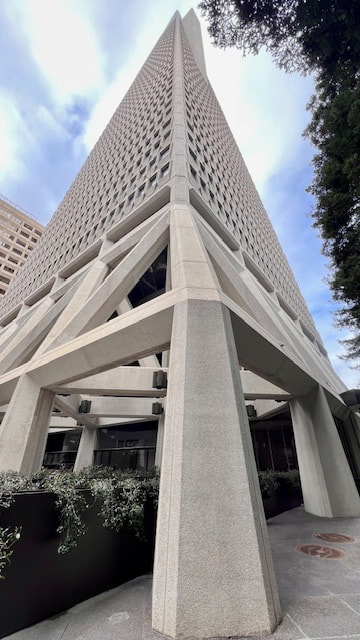
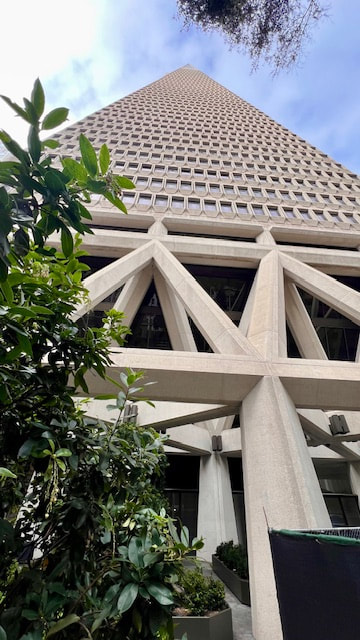
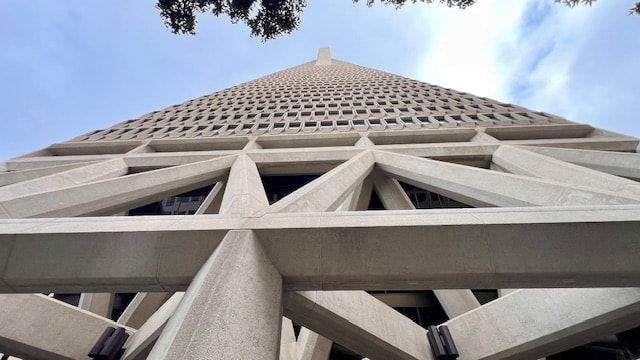






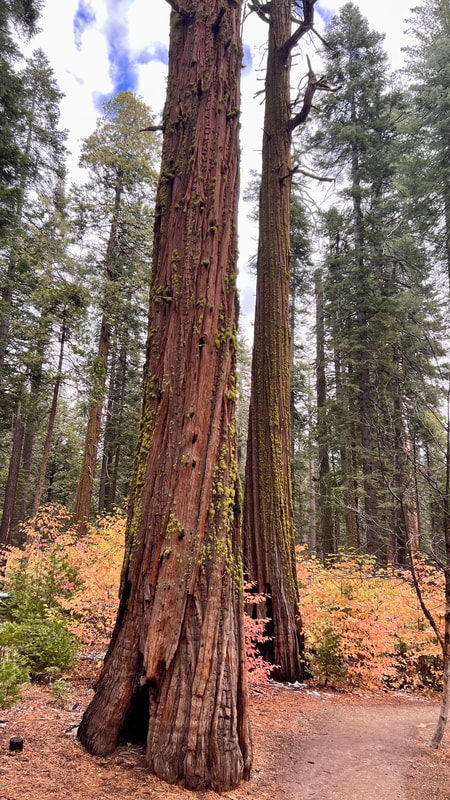
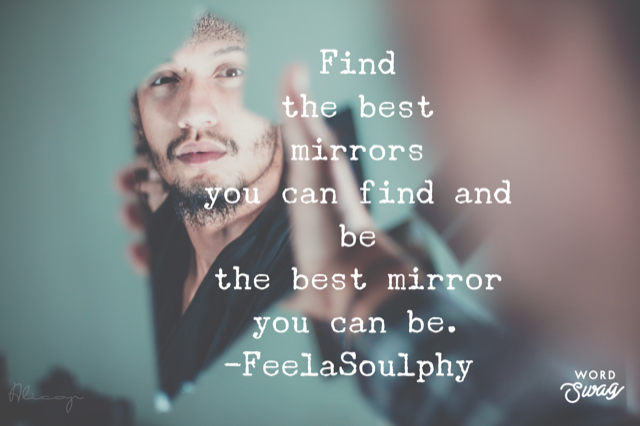
 RSS Feed
RSS Feed